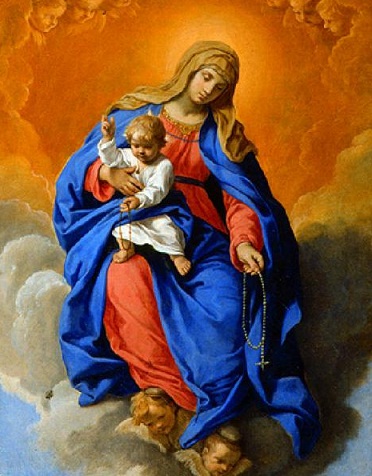 By Susan Brinkmann, OCDS
By Susan Brinkmann, OCDSSpeaking just days before the feast of the Most Holy Rosary in 2010, then Pope Benedict XVI advised the faithful to pray the rosary daily and use it to meditate on the mysteries of Christ "in union with Mary, the Virgin at prayer" which "strengthens us all in faith, hope and charity."
During this address, which took place in Palermo, the Holy Father called Mary the "model of Christian life" and commended all of the people of God to Her care.
"Mary is the model of Christian life. I ask her above all to help you all walk the path of holiness, briskly and with joy, in the footsteps of many shining examples of Christ” he said, adding that "the daily meditation on the mysteries of Christ in union with Mary, the Virgin at prayer, strengthens us all in faith, hope and charity."
During his pontificate, our Pope Emeritus constantly called attention to the efficacy of the Rosary. In 2008, while reciting the Rosary in Rome's historic Basilica of St. Mary Major, he reminded the faithful that this prayer is not "a pious practice banished to the past, like prayers of other times thought of with nostalgia. Instead, the Rosary is experiencing a new Springtime."
He went on to say that in the current world, which is so dispersive, "this prayer helps to put Christ at the center, as the Virgin did, who meditated within all that was said about her Son, and also what he did and said."
 When we recite the Rosary, we relive important and meaningful moments in our own salvation history. "The various steps of Christ's mission are traced. With Mary the heart is oriented toward the mystery of Jesus. Christ is put at the center of our life, of our time, of our city, through the contemplation and meditation of his holy mysteries of joy, light, sorrow and glory."
When we recite the Rosary, we relive important and meaningful moments in our own salvation history. "The various steps of Christ's mission are traced. With Mary the heart is oriented toward the mystery of Jesus. Christ is put at the center of our life, of our time, of our city, through the contemplation and meditation of his holy mysteries of joy, light, sorrow and glory."
He encourages us to welcome within ourselves "the grace emanating from these mysteries, so that through us we can 'water' society, beginning with our daily relationships, and purifying them from so many negative forces, thus opening them to the newness of God.
"The Rosary, when it is prayed in an authentic way, not mechanical and superficial but profoundly, it brings, in fact, peace and reconciliation. It contains within itself the healing power of the Most Holy Name of Jesus, invoked with faith and love at the centre of each 'Hail Mary'."
Later that same year, just before reciting the Rosary at the Pontifical Shrine of Pompei, he drew attention to the great apostle of the Rosary, Blessed Bartolo Longo, who drew all his energy and perseverance from the Rosary, and called upon the faithful to follow his example.
"To be apostles of the Rosary, however, it is necessary to experience personally the beauty and depth of this prayer which is simple and accessible to everyone."
Even though it is a prayer of many words, the Rosary is actually a "school of contemplation and silence," he said.
"At first glance, it could seem a prayer that accumulates words, therefore difficult to reconcile with the silence that is rightly recommended for meditation and contemplation. In fact, this cadent repetition of the Hail Mary does not disturb inner silence but indeed both demands and nourishes it."
The silence "surfaces through the words" he said, not as emptiness, "but rather as the presence of an ultimate meaning that transcends the words themselves and through them speaks to the heart. Thus, in reciting the Hail Mary, we must be careful that our voices do not "cover" the voice of God who always speaks through the silence like the "still small voice of a gentle breeze" (1 Kgs 19: 12).
Today's feast was established by Saint Pius V on the anniversary of the naval victory won by the Christian fleet at Lepanto, October 7, 1571. The victory was attributed to the help of the holy Mother of God whose aid was invoked through praying the Rosary.
© All Rights Reserved, Living His Life Abundantly®/Women of Grace® http://www.womenofgrace.com
